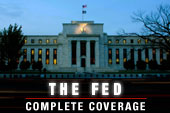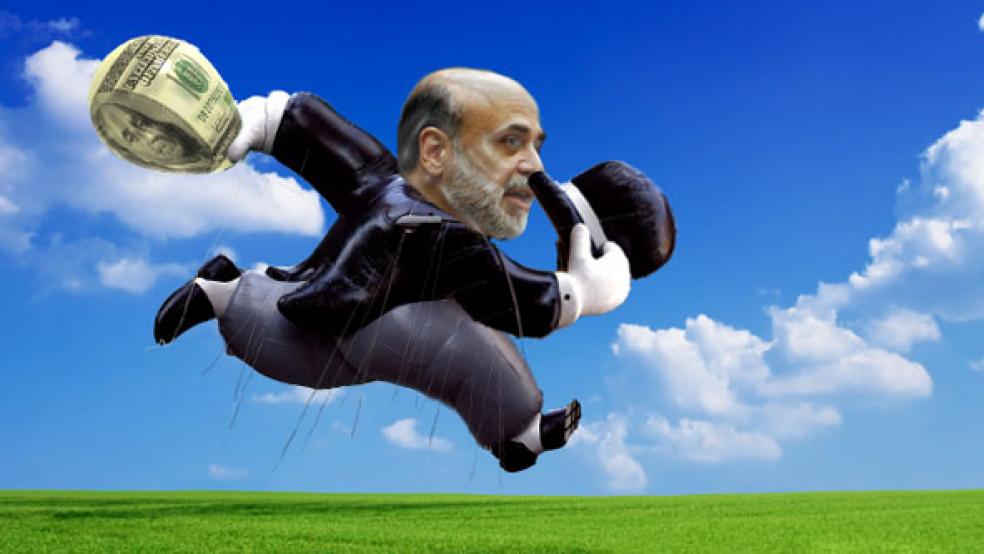More than three years into a sluggish recovery that has yet to escape the clutches of the recession, Federal Reserve Chairman Ben Bernanke scrapped the notion that the economy responds to doses of stimulus with a fixed deadline.
The Fed announced Thursday it would buy $40 billion of mortgage-backed securities each month and potentially other assets until there is clear evidence of a steadily improving jobs picture. It’s aggressive but not a “panacea,” Bernanke acknowledged at a press conference, adding, “it does have enough force to nudge the economy in the right direction.”

Here is what Bernanke means: The Fed alone can’t power the economic drivetrain that much faster without help from Congress and the White House, but it can reduce the level of friction both through its actions and communications so that the recovery faces less resistance.
For the better part of the year, Bernanke has called on lawmakers to adopt policies that spur additional economic growth, a request that has gone unanswered to the detriment of the economy. The Fed chairman reiterated his position again on Thursday, noting the Fed would be unable to absorb the shocks if the government plunges off the fiscal cliff —a mix of tax hikes and spending cuts—at the end of the year.
“Our job is to use the tools we have,” he said. “Of course, we would like to see policies across the board to address these issues, but that is not our provenance.”
Unlike the two previous versions of quantitative easing that bought government debt and mortgage-backed securities, officials on the central bank’s Federal Open Markets Committee stressed this time that they would let the conditions—instead of the calendar—determine how much monetary stimulus is needed.
The move reflects the unique power of a relatively independent institution that, unlike Congress and President Obama, isn’t restricted by the politics of the annual federal budget. It’s unlikely to cause a sudden acceleration in the economy ahead of the November election, though a win by Republican Mitt Romney could now cause a market downturn by signaling a shift in monetary policy.
“While we think today's decision will not impact the election, given Gov. Romney's statement that he would not reappoint Chairman Bernanke, we think the markets could react poorly to a Romney victory since it could be taken as a sign of the end of Fed accommodation,” wrote Brian Gardner, an analyst for the investment bank Keefe, Bruyette & Woods.
Bernanke didn’t say how many more Americans need to be hired before the policy draws to an end, refusing to provide any more specifics other than that the slight progress of the past year is unacceptable.
“There’s not a specific number in mind, but what we’ve seen in the last six months isn’t it,” the Fed chairman said. Unemployment remains a naggingly high 8.1 percent, having barely budged since January. Meanwhile, the government reported this week that household income dropped between 2010 and 2011, and discouraged workers are exiting the labor force in droves.
By taking mortgage-back securities off the market, the Fed hopes to press down interest rates that are already historically low, making it easier for companies and potential homeowners to borrow.
The statement Thursday also noted that the fed funds rate—the interest rate for banks to borrow from each other—should stay near zero through the middle of 2015, extending that timeline by at least six months amid internal projections that the economy will grow slower than Fed officials estimated in June.
Along with the Operation Twist program to sell short-term Treasurys for those with a longer maturity, the Fed will increase its holdings of long-term debt by $85 billion a month.
Markets rejoiced at the Fed announcement, with the Dow Jones Industrial Average closing up 206.51 points, or 1.55 percent. Wall Street had been anticipating the announcement of QE3 since the start of summer. But several economists see the Fed as essentially working around the fringes of a complex problem—the burst of a housing bubble that triggered layoffs and left the debt-ridden consumers who represent more than two-thirds of the economy reluctant to spend at a level that would fuel growth.
Because the Fed already controls $850 billion of agency mortgage-backed securities, there is only $550 billion in the hands of private investors to buy, noted Paul Edelstein, U.S. economist for the analyst IHS Global Insight. If the policy announced Thursday continues without much progress on the jobs front, the Fed would own the entire supply of this form of debt by the second half of 2014.
“The implication is that the Fed is pulling out all the stops to drive down mortgage rates with this program,” Edelstein wrote. “But our model work suggests that even if the Fed pushed mortgage rates down from current historic lows, the impact on GDP growth and unemployment would probably be imperceptible.”




